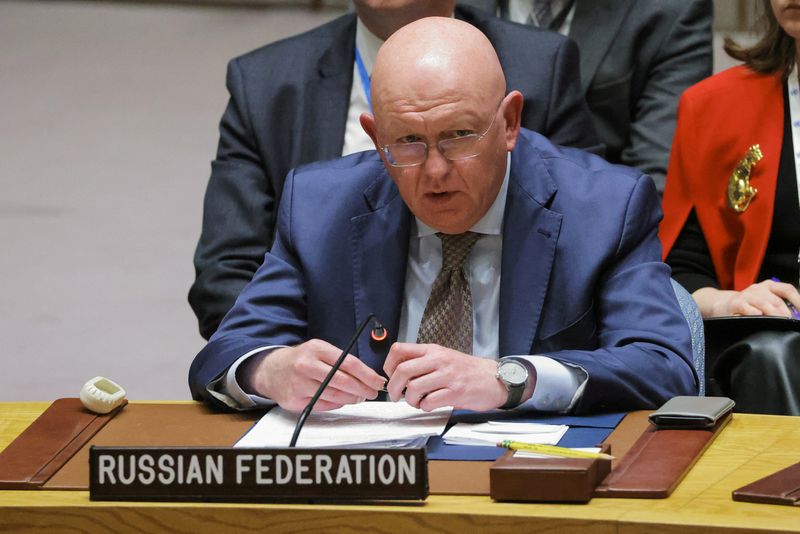By Michelle Nichols
UNITED NATIONS (Reuters) – After being diplomatically isolated at the United Nations over its invasion of Ukraine, Russia appears smug as the United States suffers a similar fate for its support of Israel and its war against Hamas in the Gaza Strip.
More than three-quarters of the 193-member U.N. General Assembly on Tuesday backed a demand for an immediate humanitarian ceasefire in the two-month long conflict after the U.S. vetoed the measure in the Security Council days earlier.
“With its veto the American side essentially issued a license to kill and now bears full responsibility for each new victim of the conflict in Gaza,” Russia’s U.N. Ambassador Vassily Nebenzia told the General Assembly after the vote.
“Sharing this blame with them is something that other members of Security Council and members of the U.N. as a whole should not be asked to do,” he added.
The General Assembly resolution demanding a ceasefire in the Israel-Hamas war was adopted on Tuesday with the overwhelming support of 153 countries, while the United States, Israel and eight other countries voted no and 23 countries abstained.
“They are loving it,” a senior European diplomat, speaking on condition of anonymity, said of Russia watching the U.S. come under fire at the United Nations for its support of Israel.
Ahead of the vote, U.S. President Joe Biden said that Israel was losing international support for its campaign to wipe out the Palestinian group Hamas because of “indiscriminate bombing.”
Israel has bombarded Gaza from the air, imposed a siege and launched a ground offensive in retaliation for an Oct. 7 attack by Hamas that Israel says killed 1,200 people and saw 240 people taken hostage. Gaza’s health ministry says 18,608 people have been killed and 50,594 wounded.
RUSSIAN RESET
General Assembly resolutions are not binding but carry political weight, reflecting a global view on the war.
When asked if Washington felt diplomatically isolated, State Department spokesperson Matthew Miller on Wednesday said there was “a long history of fairly overwhelming vote counts when it comes to resolutions that involve the state of Israel at the General Assembly.”
“One of the things that we continue to hear about from our partners in the region, and from countries all around the world, is the indispensability of American leadership with respect to this issue,” Miller told reporters on Tuesday.
Russia saw itself isolated by the General Assembly over its invasion of Ukraine in February 2022.
“Russian diplomats see the war in the Middle East as a huge opportunity to reset their position at the U.N. They have made strenuous efforts to highlight U.S double standards over the war,” said Richard Gowan, U.N. director at the International Crisis Group. “They know that Ukraine and its allies won’t dare float any resolutions targeting Moscow … for a while.”
The world body adopted six resolutions on the conflict in the first year – denouncing Moscow and demanding it withdraw all its troops. A resolution in October 2022 – condemning Russia’s “attempted illegal annexation” of four regions in Ukraine – won the greatest support with 143 states voting yes.
But some diplomats have now signaled that U.S. credibility in rallying support at the United Nations for issues like Ukraine may have been compromised over its shielding of Israel.
“The U.S. and other Western governments have quite rightly taken clear positions in support of human rights and the laws of war when it comes to Russian atrocities in Ukraine and Hamas’ atrocities in Israel,” said Louis Charbonneau of Human Rights Watch. “But international law applies equally to everyone.”
(Additional reporting by Daphne Psaledakis in Washington; Editing by Don Durfee and Grant McCool)
